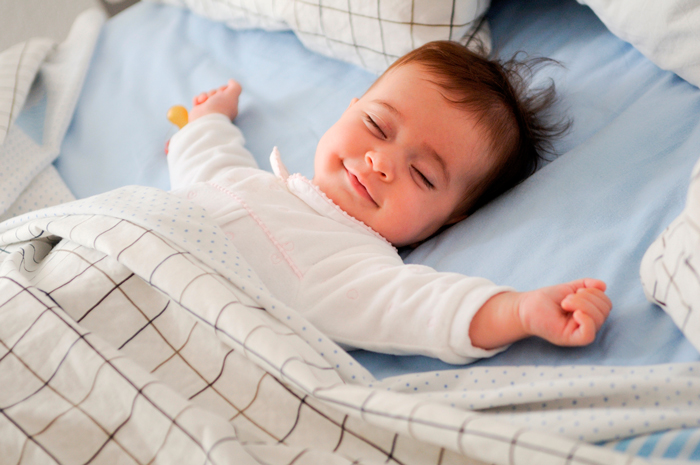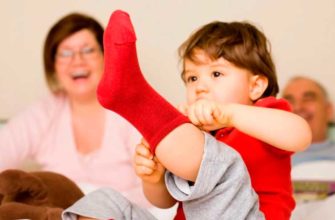Parents often wonder how much their children should sleep. An adult feels whether he has slept enough, can calculate the approximate time of his sleep, determine for himself when it is time to go to bed in order to be awake in the morning. But what about children?

The sleep of each person is individual, as are the other physiological processes. Each child has his own sleep and wakefulness regime. So making the child go to bed and wake up at a certain time, which is considered the "norm", is useless and even cruel. Nevertheless, doctors calculated a very specific sleep time that children need to be healthy. In reality, these figures differ slightly from the statistical ones - plus or minus 1 hour.
Sleep rate for children according to age
Newborns can sleep up to 20 hours a day. The fact is that during the first month of life in the body crumbs complex processes take place, which require a lot of strength and energy.
The norm of sleep changes as the child grows older:
- 1 month - 15-18 hours (8-10 hours at night and 6-9 hours during the day, daytime dreams - 3-4 or more);
- 2 months - 15-17 hours (8-10 hours at night and 6-7 hours during the day, 3-4 daytime sleep);
- 3 months - 14-16 hours (9-11 hours at night and 5 hours in the afternoon, 3-4 daytime sleep);
- 4-5 months - 15 hours (10 hours at night and 4-5 hours during the day, 3 daytime sleeps);
- 6-8 months - 14.5 hours (11 hours at night and 3.5 hours during the day, 2-3 daytime sleep);
- 9-12 months - 13.5-14 hours (11 hours at night and 2-3.5 hours during the day, 2 daytime sleeps);
- 1-1.5 years - 13.5 hours (11-11.5 hours at night and 2-2.5 hours in the afternoon, 1-2 afternoon sleep);
- 1.5-2 years - 12.5-13 hours (10.5-11 hours at night and 1.5-2.5 hours during the day, 1 day's sleep);
- 2.5-3 years - 12 hours (10.5 hours at night and 1.5 hours during the day, 1 day's sleep);
- 4 years - 11.5 hours, the baby is no longer required to sleep during the day;
- 5-6 years - 11 hours, the baby is no longer required to sleep during the day;
- 7-8 years - 10.5 hours of night sleep;
- 9-10 years - 9.5-10 hours of night sleep;
- 11-12 years - 9.5-10 hours of night sleep;
- from 12 years old - 9-9.5 hours of night sleep.
Calculating how much your baby sleeps is easy. Observe his sleeping time for several days (excluding bedtime and feedings). Then calculate the daily average.
As the baby grows up, the duration of his healthy sleep at night decreases. For adults, it’s enough to sleep about 8 hours a day for good health.
[sc name = ”ads”]
How to understand that the baby does not get enough sleep?
Until the age of 6 months, children fall asleep on walks, while feeding, in strollers - anywhere, when they want to take a nap. After six months, some facts may already indicate that the child is not enough sleep:
- the baby falls asleep in a car or wheelchair immediately after the start of movement (such a dream is not healthy and of good quality - it is superficial and is caused only by overwork, and after stopping the transport the baby wakes up immediately);
- in the mornings, the child gets up later than 7.30 (for kids, the biological clock is arranged so that it is best for them to wake up from 6 to 7.30 - in this case they will sleep and in a good mood);
- the baby wakes up regularly before 6 in the morning (this also indicates problems with sleep and overwork, so it makes no sense to send the children to the crib later, so that they get up later);
- the baby constantly falls asleep and wakes up in tears (this is another evidence that the child is sent to the crib and wake up not when he needs to).
Signs of lack of sleep are the same for young children and adolescents. They become irritable, show aggression and are often capricious.There is also chronic fatigue if the child can suddenly fall asleep or lie down during the day and overslept until the next morning.
Remember that a healthy sleep of the right duration is important not only for the good mood of your child. It also helps to strengthen immunity, harmonious development, improve physical abilities and intelligence.
We also read:









What scientists say is, in my opinion, a convention.
My baby (8 months) falls asleep in the car and on the street, the wiggle stop does not affect her in any way. Then it’s not capricious. She likes motion sickness. She wakes up in the morning at 8 in the morning. But during the night she can wake up to feed up to 3 times.
Research is certainly good, but you need to listen to a living organism, as everyone has it differently. Including in children. It’s not worthwhile, I think, to immediately look for deviations from the established norm, if at the same time the baby is behaving normally.